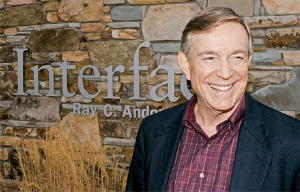Remembering Ray Anderson, Sustainability Maverick
Ray Anderson, founder of carpet company Interface and a longtime advocate for business involvement in sustainability issues, died on Monday.
We remember this week Ray Anderson, one of the earliest and biggest voices for the role that business must play in sustainability efforts. Anderson, who founded the carpet company Interface, died on Monday.
According to an obituary at environmentalleader.com, “Anderson set a seemingly radical goal for the firm: ‘Mission Zero,’ a commitment to eliminate any environmental impacts by the year 2020. Shortly before his death, he estimated that the company was more than halfway towards this vision.”

In 2009, MIT SMR provided a timeline of Anderson and Interface’s complicated embrace of sustainability, in Bruce Posner’s story “One CEO’s Trip From Dismissive to Convinced.” Take, for instance, Anderson’s comments on the company’s 1995 decision to focus on waste elimination:
“You realize there are huge technical challenges. The waste elimination effort — that’s pretty straightforward — the sort of thing we ought to be doing anyway.” But tackling other areas like emissions and energy consumption was a different story. “We had no idea what was coming into our factory, but what comes in will go out, either in the product or in waste or emission or effluents. And that’s a huge spectrum of stuff that needs to be understood and dealt with.”
The company’s Toxic Chemical Elimination Team sets ambitious goal of eliminating the need for filters by redesigning products and processes. “Filters only concentrate the pollution,” says Anderson, “and then what do you do? Throw the filters away? There is no ‘away.’” At the time, Anderson notes, no one knew how to recycle nylon or PVC. “No one was doing this anywhere in the world.”
Anderson participated in an executive roundtable with MIT SMR in 2009, on “Capturing the Green Advantage.�

Comment (1)
The Service Cycle..Regenerative Business..’Green’ Profit.. | Pigs Will Fly | the can do community blog